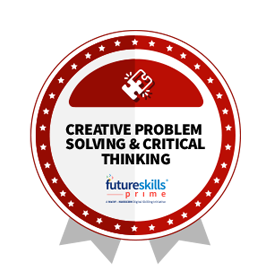Course Provider

What will you learn in this Successfully Managing Change course?
- Accept there are no normal or abnormal ways of reacting to change, but that we must start from where we are.
- See change not as something to be feared and resisted but as an essential element of the world to be accepted.
- Understand that adapting to change is not technical but attitudinal. Change is not an intellectual issue but one that strikes at who you are.
- Recognize that before we can embrace the way things will be, we may go through a process of grieving, and of letting go of the way things used to be.
- See change as an opportunity for self-motivation and innovation.
- Identify strategies for helping change to be accepted and implemented in the workplace.
Successfully Managing Change
-
 Skill Type
Professional Skills
Skill Type
Professional Skills -
 Domain
Problem Solving & Critical Thinking
Domain
Problem Solving & Critical Thinking -
 Course Category
Deepskilling Course
Course Category
Deepskilling Course -
 Nasscom assessment Coming Soon
Nasscom assessment Coming Soon -
 Course Covered under GoI Incentive
No
Course Covered under GoI Incentive
No -
-
 Course Price
INR 2000+ 18% GST
Course Price
INR 2000+ 18% GST -
 Course Duration
20 Hours
Course Duration
20 Hours
-
Who should take this Successfully Managing Change course?
- Young professionals
- Entrepreneurs
Curriculum
- What is Change?
- What is Change Management?
- The Human Reaction to Change
- The Pace of Change
- Dealing with Resistance
- Adapting to Change
- Coping with Reactions to Change
- Delivering Your Message
Tools you will learn in this Successfully Managing Change course –
- Change Impact Assessment
- Stakeholder Analysis
- Change Readiness Assessment
- Communication Plan
- Change Management Plan
- Resistance Management Plan
- Training and Development Plan
- Coaching and Mentoring
- Feedback Mechanisms
- Continuous Improvement Processes
FAQs
Change management is a business discipline that manages organizational change
- Without management, change projects are much less likely to succeed.
- Management boosts project outcomes, cuts costs, and increases efficiency.
- Change leadership and management create a change management strategy and provide project direction, ensuring that changes produce real returns.
Here are a few broad categories of change:
- People – Changes that impact people can include changes to company culture, job duties, employee training programs, customer experience enhancements, and so on.
- Processes – Internal processes can also be changed, ranging from supply chain logistics to accounting processes.
- Structure – A company that makes changes to its hierarchy, management structure, and so forth, is making structural changes.
- Technology – Digital adoption, software adoption, and other technology adoption efforts must be managed.
Change managers organize, strategize, monitor, and oversee a change project.



